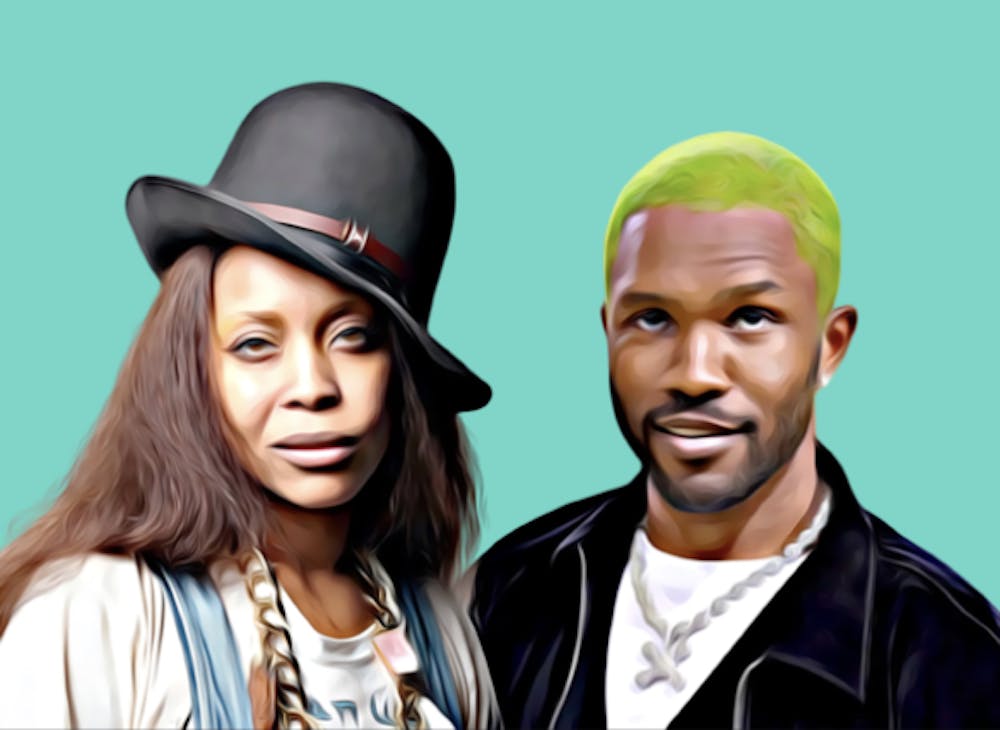“[Music is] going through a rebirthing process, and I found myself being one of the midwives,” said Erykah Badu after the 1997 release of her first album, “Baduizm,” which turned 25 two weeks ago. As Black History Month comes to a close, it becomes increasingly important to remember the contributions of Black artists like Badu — often referred to as the “Godmother of Neo-Soul.” Through her work, she would go on to influence an entire generation of successful, genre-bending artists driven by her experimentation, from Frank Ocean to Ari Lennox.
In the mid-’90s, mainstream contemporary R&B was in its prime, dominating the charts with the hip-hop-laced works of TLC, Brandy, Mary J. Blige, R. Kelly and SWV. As R&B progressed towards dependency on electronic drum machines and synthesizers, the debut of Erykah Badu, D’Angelo, Maxwell and Lauryn Hill marked a turning point in contemporary music toward a more timeless, soulful and organic sound.
The term “neo-soul” is accredited to label executive Kedar Massenburg, who coined the phrase after signing Badu and D’Angelo to market the commercial breakthrough of the subgenre. Neo-soul differentiated itself from contemporary R&B with its unconventionality, live instrumentation, and deep roots in soul, funk, gospel, hip-hop, jazz and old-school R&B.
From the outset, “culturally conscious” lyricism surfaced as the spirit of neo-soul. Badu’s astute literary motifs and spiritual references evoke an aura of cunning wisdom on “On and On,” the second track on the album — “If your knowledge were your wealth, then it would be well-earned / If we were made in his image, then call us by our names / Most intellects do not believe in God, but they fear us just the same.”
The fundamental releases of Badu’s “Baduizm” and D’Angelo’s “Brown Sugar” revitalized the sound of soul with eccentric vocals that oozed velvety warmth and sultry twang. The movement hit its stride in the late ’90s with time-honored, neo-soul hits like Lauryn Hill’s “Doo Wop (That Thing)”, D’Angelo’s “Untitled (How Does It Feel) and “You Got Me” by The Roots & Erykah Badu.
Lauryn Hill was also an essential player in elevating neo-soul to mainstream audiences. Her 1998 debut album “The Miseducation of Lauryn Hill” won five out of 10 nominations at the 41st Annual Grammy Awards, making Hill one of only 10 Black artists to have won "Album of the Year.” The record-breaking project — a fusion of R&B, hip-hop, reggae and soul — is widely regarded as one of the best albums of all time and has been hailed as a prolific source of musical inspiration for Adele, Drake, Beyonce, SZA and Kanye West.
Multi-talented producer, drummer, rapper and singer Anderson .Paak is another prime example of the persistent impact of neo-soul on the current music climate. .Paak has closely collaborated with neo-soul artists like Thundercat, Kaytranada and The Free Nationals to produce an inimitable, vibrant discography. Funky, vivacious basslines bounce between polished drum patterns and soulful chord progressions on “Come Down,” the most notable track from .Paak’s Grammy-nominated album “Malibu.”
Perhaps the most sterling embodiment of the future of soul music is the abstract and amorphous band Hiatus Kaiyote. The Australian neo-soul group has been praised by soul’s founding contributors — Prince, Badu, and Stevie Wonder — for its complex rhythmic structures, entrancing vocals, and diverse textures and grooves.
Frank Ocean’s “Channel ORANGE” and “Blonde” – two of the decade’s most revered and influential neo-soul records – draw from a wide array of influences from psychedelic rock to Motown, but Ocean’s expressive vocals are a testament to his reverence for neo-soul and D’Angelo, whom he included on a list of his favorite songs in 2016.
On “Pink + White,” Ocean delivers sentient lines like: "You kneel down to the dry land, kiss the Earth that birthed you / Gave you tools just to stay alive and make it up when the sun is ruined.” The minimalistic instrumentals and emotionally intricate lyricism allow Ocean’s soundscapes to levitate above the sonic conventions of R&B.
Historian Sarah Fila-Bakabadio writes that neo-soul is “hybrid and indefinable,” without a distinct timeline or border.
“While in the 1970s, soul meant affirming Blackness and maximizing ethnic difference,” Fila-Bakabadio continues, “neo-soul intersects the histories and cultures of African Americans, Africans, and other Black communities worldwide to produce a new sound.”
The soul revival restored a sense of nostalgia for the music of the 20th century and transcended genre boundaries — the legacy of the neo-soul movement lives on through unconventional artists like The Internet, Steve Lacy, Smino, Lucky Daye, Jenevieve, Umi, SiR, NxWorries and more. Neo-soul remains an essential part of Black culture, and continues to impact Black musical artistry and expression to this day.







